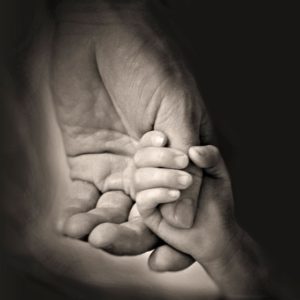by Bhumika Anand
To me, the word ‘family’ always conjured something large and elusive.
Growing up, as an only child with just parents to look up to and love, family was a small word. It was, at the time, also a small world.
My parents had a runaway wedding. Fiercely independent and unconventional, my father had broken away from his Shetty roots in Mangalore to settle in the relative anonymity of Bangalore. Other than a money order he continued to send till his mother was alive, he was estranged from his family. My mother, who was eighteen at the time of the wedding, lived with her sister and her husband then. When she married my father in a civil court in Bangalore, she escaped a life of being little more than a glorified maid at her sister’s house.
For three months after this wedding, she was estranged from her family of eight siblings till a peace was brokered by my father because he knew they were important to her, and all was ostensibly forgiven.
This was the history about my parents I grew up knowing.
I looked up to my father a lot. Papa made me feel important, special. I knew that nobody loved me as much as he did. He was my playmate and my teacher. He bought me anything I wanted. He always had time to spend with me. He had even given up smoking for me. He had promised. Even as a six-year-old, I knew promises meant something. His words made me feel secure and complete.
Knowing in my adulthood that he may never have truly stuck to it brought about the disillusionment so typical of families: parents are fallible.
My mother never figured in my childhood except to fulfil my needs or tell me stories. We only developed a relationship in my teens when we spent hours talking about family, love, relationships, sex. Mother was the disciplinarian. She was the one who punished me when I spoke out of turn (and I did that a lot). She was the one who taught me Mathematics, a subject I hated. And she was the one who often took me out to meet her family – her sisters, brothers, and their children, my cousins – because it was the only extended family we had, and it gave her a sense of community and belonging.
I never liked any of them.
They made fun of me because I didn’t speak Kannada the way they did. They made fun of me because I never found their I-hit-that-man-with-a-stone kind of slapstick funny. They made fun of me because I was plump.
I had uncles slap my back painfully hard and say, “What rice do you eat? How are you so plump?”
I had aunts who would pinch my cheeks in a show of affection so my eyes would tear and they would say, “Look at her cheeks, regular kadubus.”
But they were quick to supply me with laddo, kobbari mittai, obattu, and other sweets and oily items and watch with a strange glint in their eyes as I dug in. Even as a child, I was never grateful to them for the sweets or the oily food because I used to overhear or be told directly that I was not a good-looking child and wasn’t it so strange that I was born to such a handsome couple! At that age, the insult only vaguely registered. I knew my parents loved me – face and body and all – and that was enough. At that age, I just enjoyed the sweets because I love sweets.
I have since always wondered how they never managed to dent my self-confidence or give me lasting body image issues. In hindsight I know that they could never scar me because I never respected them. Even so, these comments and judgments became a reason for fights between my parents. My father hated that they tried to interfere in our household. My mother, a confirmed non-confrontationalist, tried to balance kinship and wifely duties.
I had an aunt who needed constant reassuring. Her sarees, her jewellery, her sense of style, her friends, her family were the greatest. After every serving at a meal, she would say, ‘Isn’t the sambhar so delicious? Don’t you think no one makes sambhar better than me?’ And I would have to say, ‘Yes, dodamma, this is good.’ Often, I didn’t think it was. I had my mother’s food at home and it was better. No one thought of rebuking my aunt. My mother had instructed me never to speak the truth there – because family.
Another aunt always wept when she saw us. It was always about how they never had enough and on top of that her husband was always hurtful, how he never spoke to her relatives or let her visit them. The same husband was always happy to see us. He would take me to the garden and show me flowers, and he would cut paper in beautiful shapes of animals and other patterns. The aunt would shout, ‘What are you doing? Why are you wasting all that paper?’ My mother never confronted my aunt but she was kind to my uncle. Every time he was in hospital, my mother took food for him until the day he died. And aunt sobbed the loudest when he died. For three days she wailed about how her life was useless now. In three months, she looked happier than I had ever seen her.
This brand of familial relationships was so different from the lessons my own parents were teaching me in our tiny family about honesty, communication, respect, and about really caring for each other.
The aunts and uncles hated our tiny unit and tried to make mischief. Mother always argued with my dad after visiting her sisters: I was too vocal; I didn’t respect my elders and told them off and he seemed to encourage my forthrightness. The arguments would then spiral into nasty fights.
When I got older and after I had read a lot of literature, my mother and I discussed how these fights were direct consequences of the interference of her siblings. In time, my mother stopped getting brainwashed by her siblings and started seeing them for who they were. My mother finally learnt to accept that the family she was born into was small-minded. They each had their own agendas, and they never truly wished her well.
Even so, my parents insisted we learn to forget and forgive them because they were family. They tried their best to be there for them even if they got nothing in return.
But I could never claim these relatives as my own people.
Somewhere there was this ideal of a large family that came from the books I read. It was the sort of love my parents and I had for each other, only it would extend to include more people. Being an only child makes you lonely. It’s not always a bad thing. It only means you can fill your life with people who matter. People who care. Like in every Nora Roberts I consumed so avidly in my teens. The books I read talked of large families that stayed together because they enjoyed each other. There was nothing toxic. They argued, smashed vessels, had slanging matches, but no one doubted the love they had for each other. I always dreamt of belonging to a large family like that.
Unexpectedly, in my mid-20s, I finally found it in the middle of a food court in a tech company with people I never imagined getting to know or loving.
We were each so different! Yet when we came together, it was – to quote a cliché – magic.
We came together as colleagues who had time to kill in between deadlines and traffic jams. In our own ways, we were all misfits within our own extended families. We had all been looking for a support system and a family to belong to and feel truly accepted in. And somehow, in a food court sipping watered down coffee, we found it in each other.
In my late 20s, when I first decided to take a sabbatical for health reasons, my friends who were then in the US and Germany assured me not just about my decision but also reassured me about finances. When my father was diagnosed with a brain tumour, it was my friends who rallied around, opening up their houses and organising transport. They saw to it that my mother and I were well-fed and looked after the whole time. My mother and I never felt lonely or helpless during that time.
Today, after a decade of being there for each other, our ties are stronger than blood. Together we have survived job stresses, work pressures, heartbreaks, chronic illnesses, mental health issues, deaths of parents, divorces, and long distances. We are scrupulously honest with each other and openly criticise one another so we can become better versions of ourselves. It has not been easy. There have been disagreements, fights, and long periods of little communication. We are not the same young 20-year-olds who swore loudly and laughed uproariously. But we have changed together and we have accommodated those changes in each other. We have learnt to love each other even if we don’t like each other all the time. We have learnt to like each other while not understanding each other’s silences or garrulity, but caring for each other just the same.
We stuck together not because it was thrust on us but because we wanted to.
For all of us, the family we have found always comes first and all our life decisions are taken keeping this family foremost in mind. We are convinced that when we are old, senile, and disgruntled, we will live together and watch reruns of Golden Girls together so even old age will be more bearable.
The child in me exults in this large family I have been able to make, just like in the books I read. And with this came the deep contentment of never feeling alone even if today we all live in separate continents. Technology aids us every day so we don’t feel the distance much. Love ensures that all our earnings are spent on Instagrammable holidays together.






